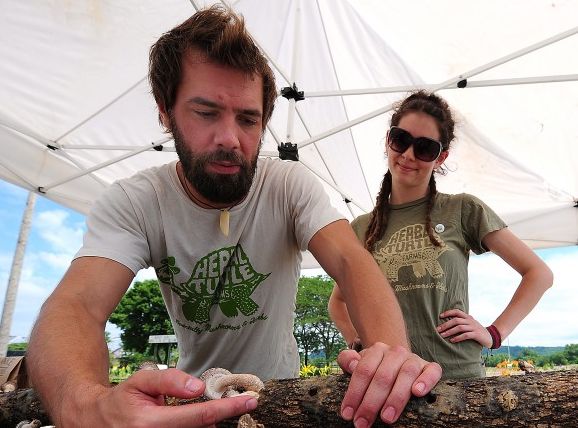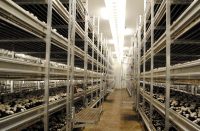Bryan Crigler walked away from a well-paying corporate job to pursue his dream. Now, he farms fungi for a living.
Bryan started Herbal Turtle Farms last year with his partner Katelyn Foerster. Today, their dreams have led to 1,000 mushroom-growing logs in a shaded forest on the outskirts of Winona. And they’re expanding to include herbs and sprouts. Using the skills from their former lives, they’re organized, determined and – above all – inspired.
Before the farm, Bryan worked in marketing, sales and even managed a call center. “One day I looked at my life,” Bryan said. “I was making a lot of money, but I wasn’t happy.” Katelyn went to college for international relations. But after a couple of months interning at a community-supported agriculture farm, she gave up a corporate career path for good. “I’m living my childhood dream,” she said.
Bryan’s father, Jim, had a hobby farm where he tended bees, an orchard and a 50-log mushroom garden; with his help, Katelyn and Bryan began their operation. After participating in the Land Stewardship Project’s “Farm
Beginnings” program, they researched what kind of product to grow and what niche they could fill in the local area. Slowly, their dream took the shape of an organic mushroom farm.
Ironwood waste logs from a local logger serve as the growing tools, but the rest is up to Katelyn and Bryan. The first year of the farm was spent on business plans, log inoculation and passing a state agriculture inspection.
Each log is drilled with 30 to 50 holes that are filled with a mixture of sawdust and mushroom spawn. Then, the two farmers cover the holes with wax to keep moisture in and other organisms out. After a six to eight month rest to allow the body of the fungus to spread throughout the wood, the logs are “shocked” by soaking in water overnight. Finally, the mushrooms pop up and Herbal Turtle Farms is ready for market.
“We’re not really competing with anybody,” Bryan said. “We just complement everything else (at the market).” At their first few farmers markets, they ran out of mushrooms within three hours. Now, they sell about 45 bags of shiitakes each time, fueled by a steady base of return customers.
“We’re out here every day, which is fine because it’s my favorite place to be,” Bryan said. “Hopefully, by next year we’ll be self-sustaining. All we’ll need to do is farm.”











